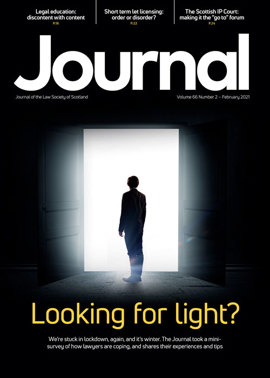Short-term let licensing: order or disorder?

Following a period of consultation last year, the Scottish Government is moving forward with the introduction of its new licensing scheme for short-term lets. The new regime aims to help local authorities balance the needs and concerns of their communities in the face of the rise in short-term lets, spurred on by technological innovation and global tourism. The draft order, the Civic Government (Scotland) Act 1982 (Licensing of Short-term Lets) Order 2021, was published over the festive break and is now moving inexorably towards enactment. It will sit within the wider licensing landscape of the Civic Government (Scotland) Act 1982, which licenses various activities from taxis to tattooists.
The publication of the draft order has initiated renewed adverse comment from those who would be affected by the introduction of the scheme. The Association of Scotland’s Self Caterers said one half of all their members would leave the industry as a result of licensing; and the chairman of tourism body SkyeConnect protested that “poorly drafted short-term lets licensing legislation would be hugely onerous to microbusinesses in Skye and right across Scotland”.
The Government’s reaction to this to date has not been to pivot on policy, but to delay the commencement of the scheme, with a revised deadline for licence applications now slated for 1 April 2023.
From a licensing practitioner’s perspective, there are several elements of the draft order that merit analysis. I have written previously (Journal, February 2020, 20) about the impact that the processing of thousands of applications and related inspections will have on local authority resource, as well as the cost to property owners in achieving compliance. These concerns are heightened by the pressure on both local councils – where a significant amount of attention is being diverted by COVID-19 – and the tourism sector, which is reeling from the impact of the pandemic.
The focus of this article, however, is on practical issues with the regulations themselves, and I have picked out three key areas for further analysis:
- single licences for multiple accommodations;
- public consultation; and overprovision.
Single licences for multiple accommodations
The order proposes, sensibly, that where you have a single building with multiple accommodations, e.g. a block of self-catering flats, then (so long as there are shared facilities) it should be the case that there is a single licence for the whole building, as opposed to individual licences for each apartment. The policy intent behind this includes, also sensibly, the idea of catching unconventional accommodations in a single location, such as pop-up “pods”.
That will certainly cut down on cost and administration, but on a practical level this could lead to difficulties in front of the licensing committee. For example, where a block of self-catering flats with shared facilities is under a single licence, then the misuse or lack of upkeep of but one of the flats could lead to licensing breaches. This means the licensed status of the whole block would be placed under threat as there is only one licence covering all of the flats. Issues arising from one flat could therefore lead to the licence being suspended. That would affect all flats, not just the one that caused or gave rise to the mischief.
Public consultation
The order proposes that neighbours within 20m of an application premises will be written to by the local authority in order to raise any views they may have. In certain city centre locations that will capture a very large number of owner/occupiers, meaning a significant amount of potential notifications for the local authority to administer. When the Licensing (Scotland) Act 2005 was working its way through the Scottish Parliament, a proposed 20m rule was dropped to 4m, as a result of concerns over the level of administration it would require.
The order also proposes that it is for the local authority to display a site notice. This inverts the position for all other licence types under the 1982 Act (e.g. public entertainment, late hours catering and so on), where it is for the applicant to organise and ensure the display of the notice. This inversion creates additional workload for the local authority and I can foresee issues over access, and from notices being torn down and so on. From the applicant’s perspective, it can hardly be welcome that errors in the site notice display might delay or frustrate the application, when they have no control over this element of the process.
Separately, there is also provision for the local authority to “combine” a site notice where there is a planning application as well as a licence application. I think that this is regrettable. I can understand the theory of cutting red tape, but the two regimes are not interconnected. The underlying law that relates to planning and to licensing is wholly separate: the criteria for assessment, the grounds for refusal and so on, are not equivalent. You cannot demand that the public grasps such intricacies and this will surely result in confusion. I have no doubt it will lead to significant issues in front of licensing committees where objectors are raising planning issues of no relevance to the consideration of a licence application. This type of thing happens now, without conflation of any site notices.
Overprovision
The 2021 order creates an “overprovision” ground of refusal for a short-term let licence. On the face of it, this appears to suggest that there are too many short-term let licences in force in a particular area. Yet it leaves this provision hanging with no corollary requirement for the local authority to assess, consult or define what it thinks overprovision looks like. Nor what the mischief is, or how this will be geographically defined.
This a real shame, given there is a very advanced approach to dealing with overprovision under the Licensing (Scotland) Act 2005, which the Parliament could have looked to utilise. It appears to me to be a potential straw man, and I can foresee unsuccessful applicants taking appeals. Also, how does this work at the point of transition into the new scheme, when there will be hundreds of applications but no “live” licences? And how does the idea of overprovision in this context link to the separate proposal to amend planning law by creating the ability to designate a short-term let “control area”? Is a planning “control area” also an area of overprovision? The creation of two competing concepts that relate to the same mischief – the idea of “saturation” of an activity in an area – is one that I think will lead to confusion when the licensing scheme goes live. This is especially true given that the levers that pull on the planning criteria and tests are not the same as those that pull on licensing criteria.
It would surely have been more efficacious to follow the 2005 Act model, and require a lawful, evidence led policy to be instituted by the licensing authority to assess and declare what overprovision is, as they see it. This would not only benefit the local authority – by making refusals less amenable to successful appeal – but also provide interested parties such as new entrants to the market, or prospective domestic property owners, with knowledge of whether a state of overprovision exists in a particular locality.
Regulars
Perspectives
Features
Briefings
- Criminal court: Discount season
- Family: Capital values in uncertain times
- Employment: Can employers require staff vaccination?
- Human rights: Protecting the child claimant
- Pensions: a bill with teeth
- Charities: commerce as public benefit?
- Property: Playing safe: on the right track?
- In-house: Wide world of in-house
In practice
- Priorities for our Parliament
- The Word of Gold: The gift that keeps on giving
- TRS: more trusts, more information, more access
- A proper conclusion
- The Eternal Optimist: Putting resolve into resolutions
- Appreciation: Professor Emeritus Robert Rennie
- Ask Ash: Trainee in a rut
- Royal Faculty invites new members






